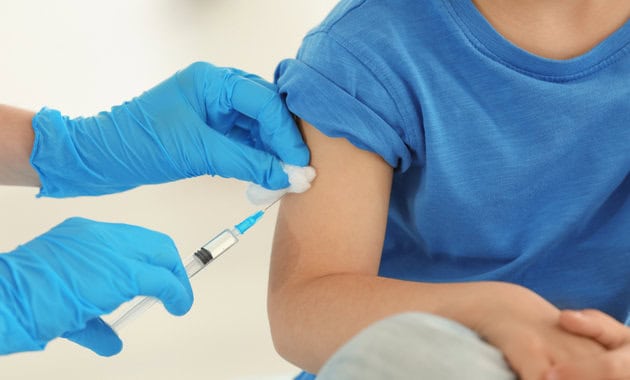
Last week of April (24th – 30th) is observed as World Immunization Week. The theme for this year is “#VaccinesWork for All” and is aimed to promote the use of vaccines to protect people of all ages against disease.
Protecting your child is a natural instinct that you cannot ignore. And part of your love and duty for your child lies in getting them regularly vaccinated. There is no doubt that immunization saves millions of lives every year. Despite the fact, there are around 20 million children all over the world who are either unvaccinated and under-vaccinated. So this year, the World Health Organization (WHO) wants to shed light on how vaccines can protect the health of everyone, everywhere.
Lesser Known Vaccines That Can Benefit Your Child
Some vaccines are delivered as early as on birth such as BCG, oral polio vaccine or DPT vaccine which can prevent a wide range of diseases such as tuberculosis, hepatitis B, polio, etc. As per the vaccination schedule recommended by the Indian Academy of Pediatrics (IAP), many vaccinations are repeated after specified periods of time and form a part of the must-to-have vaccination schedule. But there are some vaccines that you may not know about that have gained importance over time and that you might want to consider for your kids.
1. Rotavirus Vaccine (RV)
Rotavirus is the most common cause of serious diarrhea in babies and young children. Children between the ages of 6 months and 2 years are usually affected. Without a vaccine, almost all children will have at least one episode of rotavirus diarrhea before they turn 5 years old. There are two brands of rotavirus vaccine – RV1 (rotavirus monovalent) and RV5 (rotavirus pentavalent), both of which are given orally. The IAP recommends two doses of RV1 at 6 and 10 weeks or three doses of RV5 starting from the 6th week[1]. Few states have introduced this vaccine in their routine vaccination schedule.
2. Meningococcal Vaccine (MCV)
Meningococcal disease is a bacterial infection of the protective membrane that surrounds the brain and spinal cord. This disease is very serious as its onset is rapid and there is a significant risk of death. The disease may also cause mental retardation, epilepsy, deafness and other life-changing consequences.
IAP recommends this vaccine for high-risk category children such as those with
-Immunodeficiency
-Cardiac disease
-Pulmonary (lung/respiratory) disease
-Renal disease
-Children on long-term steroids
-People who travel or have pets at home
It is essential to consult a pediatrician to get to know which vaccines are best suited for your child.
3. Hepatitis A Vaccine
Hepatitis A is an acute liver disease that causes inflammation of the liver. It is transferred through contaminated food or water or by close contact with an infected person. The disease is usually mild in children but a child can transmit the infection to an adult who may experience more severe symptoms. The IAP recommends a single dose of live attenuated hepatitis A vaccine, based on the viral H2 strain at 12 months of age.
4. Tdap Booster
Tdap is a combination booster shot that offers immunization against three diseases caused by bacteria; diphtheria, tetanus, and whooping cough. Diphtheria is a respiratory disease that can cause breathing difficulties and paralysis, among other things. This bacteria that causes tetanus can get into the child’s body through a dirty cut or scrape, an animal bite or a burn. It attacks the nervous system, causing muscle spasms and can even prove fatal, if left untreated. Whooping cough causes severe coughing spasms in infants.
The IAP recommends a Tdap Booster vaccine to be first administered at the age of 10-12 years, followed by a Td vaccine every ten years that offers protection from tetanus and diphtheria.
5. Pneumococcal Vaccine
Pneumococcal vaccine protects from pneumococcal diseases caused due to Streptococcus Pneumoniae bacteria. Pneumonia accounts for 15% of all deaths of children under 5 years old and more than 2 million children die from pneumonia each year, accounting for almost one in 5 under-five deaths worldwide. 19% of global pneumococcal deaths are seen in India. It is caused by viruses, bacteria, or fungi. However, this vaccination can help prevent the respiratory infection caused by bacteria. Given at 1.5 years old, a booster dose is recommended at 2.5 months old again when 3.5 months old.
**Consult India’s best doctors here***
Make sure you consult your child’s doctor to make sure which vaccines are best for your child. Remember vaccinations given at the right time can help you give the best quality healthcare to your child. Here’s wishing your child a joyful, healthy childhood!
(The article is reviewed by Dr. Swati Mishra, Medical Editor)
Recommended Reads:
COVID-19 And Social Distancing, Lockdown Essentials And More
Vaccines For Adults: Why And What Vaccinations Are Needed For Adults?
References:
1. Indian Academy of Pediatrics (IAP) Advisory Committee on Vaccines and Immunization Practices (ACVIP) Recommended Immunization Schedule (2018-19) and Update on Immunization for Children Aged 0 Through 18 Years. Immunization Guidelines 2018-19. Indian Pediatrics. https://www.indianpediatrics.net/dec2018/1066.pdf